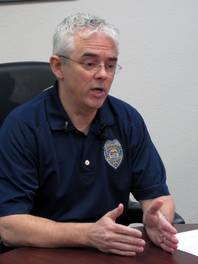Wednesday, Feb. 2, 2011 | 2:05 a.m.
Beyond the Sun

Sgt. Tim Bedwell
The North Las Vegas Police Department is considering again lobbying the state legislature to conduct a study on red-light cameras following the release Tuesday of the first definitive study on the use of the controversial cameras.
The national study, released Tuesday by the Insurance Institute for Highway Safety, looked at 99 cities with populations of more than 200,000, comparing those with red-light cameras to those without.
Researchers determined that the cameras have saved hundreds of lives. Traffic fatalities in 14 cities with red-light cameras fell by 35 percent between the five-year periods 1992 to 1996 and 2004 to 2008, according to the survey. Although the rate also dropped in the 48 cities without the cameras during that same time period, it only declined by 14 percent.
The study also said that had cameras been operating during the 2004 to 2008 time period in all large cities, a total of 815 deaths would have been prevented.
Those critical of the cameras cite concerns over privacy and of the revenue streams tied to them. But police departments nationwide have cited positive changes in driver behavior — slowing down and not racing through yellow lights — in coming out in favor of the cameras.
“This is truly empirical data,” North Las Vegas spokesman Sgt. Tim Bedwell said. “We as police officers know the carnage caused by these left turns (on red) and T-bones...We see it every day and know how dangerous it is.”
Red-light cameras have been a contentious issue for North Las Vegas Police. Alarmed by the number of accidents caused by cars running red lights, the department has lobbied state lawmakers to place red-light cameras at a handful of city intersections as part of a pilot program.
Both the Metro and Henderson police departments supported the legislation, Bedwell said, but because it was a study, the smallest of the three cities — North Las Vegas — was chosen to carry the project through.
The cameras would allow the city to collect data that officials hope would convince lawmakers to allow police to use cameras to issue traffic citations. A state law passed in 1999 prohibits traffic cameras for tickets.
To commission a study, North Las Vegas has asked lawmakers to make an exception to the law each legislative session since 2005. Each time, it failed.
“These kind of studies dispute the sort of arguments against red-light cameras,” Bedwell said. “If we can bring in a study that shows similar results, we can get support from (state) legislators (to change the law).”
In Nevada, red light violations are criminal misdemeanors, necessitating proof beyond reasonable doubt. In neighboring states, such as Arizona, which has implemented red-light cameras, the violations are considered petty crimes, requiring only probable cause.
Because running a red light is a misdemeanor in Nevada, opponents argue red-light cameras infringe upon due process. There is a presumption of guilt, said Chad Dornsife, executive director of Best Highway Safety Practices Institute, and there is no chance to confront your accuser when it is a camera.
“You can’t deny someone due process,” he said. “We feel (the cameras) are illegal and unconstitutional.”
The nonprofit group has lobbied against red-light cameras in Nevada since the issue first came to light in the 1990s, raising privacy concerns and questions about the revenue stream from red-light camera tickets.
“These cameras turn Nevada into a police state,” Dornsife said. “It’s a fraud at best and criminal at worst.”
“It’s really frustrating for us when we hear people arguing about privacy when there are already a lot of cameras in Las Vegas,” Bedwell said. “We want something that’s revenue neutral, or the public is not going to buy (the camera program) and shut it down.”
The Department of Transportation already is scheduled to introduce a bill in committee to repeal the state law banning the use of cameras for issuing traffic citations. Dornsife said he plans to fight it.
“It’s bad PR for a tourist state,” he said. “It’s short-sighted and ill-advised.”

Join the Discussion:
Check this out for a full explanation of our conversion to the LiveFyre commenting system and instructions on how to sign up for an account.
Full comments policy